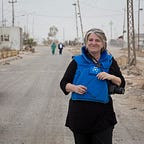Cash provides choice and relief for families in Iraq
How the World Food Programme (WFP) in Iraq is using cash assistance, empowering uprooted families to buy their own food again.
For Qasim Jamel and his brother Faris, the emergence of the so-called Islamic State of Iraq and the Levant (ISIL) marked the end of normality as they knew it. They lived with their families under ISIL occupation for almost two years until they finally escaped and took refuge in a camp near Mosul, Debaga 2.
While living conditions were far from ideal, the camp has become a safe haven for thousands of families that faced the same struggle.
Receiving a helping hand
At first, the main source of humanitarian assistance Qasim and his relatives received came from WFP. Food rations containing a month’s supply of wheat flour, bulgur, lentils, salt, sugar, and cooking oil gave them relief and ingredients to cook family meals.
Now, WFP is transitioning from food rations to cash assistance, allowing people like Qasim and Faris to buy food for their families, something they have not been able to do in a very long time.
For the past three years, ISIL occupation in Iraq has forced more than three million people out of their homes. When fighting to retake Mosul and surrounding areas began in October last year, insecurity deepened, development came to a halt, and humanitarian needs skyrocketed.
A treacherous journey
The presence of ISIL and the ensuing conflict prevented Qasim, Faris and their families from finding a safe place to settle. First, they had to flee from their hometown of Makhmur to Hawija with their wives, small children, and siblings. As time passed, feeding a family in Hawija became increasingly difficult; a siege cut supply routes and access to food, clean water and medicine, so the brothers were forced to upend their families once more.
While their families received ready-to-eat food from WFP when still on the road, the journey was no less treacherous. They had to leave in the night and pass a field full of mines in order to escape ISIL in Hawija.
Faris arrived in Debaga camp first, with his wife Sahar and their three children — the youngest was not yet born. Then followed Qasim and his wife Suhan, also pregnant at the time, and their small toddler. Their parents, siblings, and older brother’s family soon followed.
“I should have gone with my brother, when his family left five months before us, because the situation only got worse and worse. It was so bad. We had no food, no medicine, the water was dirty and we never had electricity,” Qasim explained.
Return to relative normalcy
With generous support from the European Commission’s Humanitarian Aid and Civil Protection department (ECHO), Qasim and Faris will receive a text message from WFP announcing when and where they can pick up their entitlement of around 14 euros per family member each month.
The brothers try to take construction work when possible. But, if lucky, they will only work one or two days a week, earning a meager and unreliable income.
WFP cash assistance will help ensure these brothers can continue to provide for their growing families, despite the challenging circumstances.
“I know that my wife is excited to start receiving cash,” Qasim says. “She is very happy and looking forward to shopping for the family and deciding for herself what we need to buy and cook.”
You can help families like Qasim and Faris’ in Iraq. DONATE NOW.
